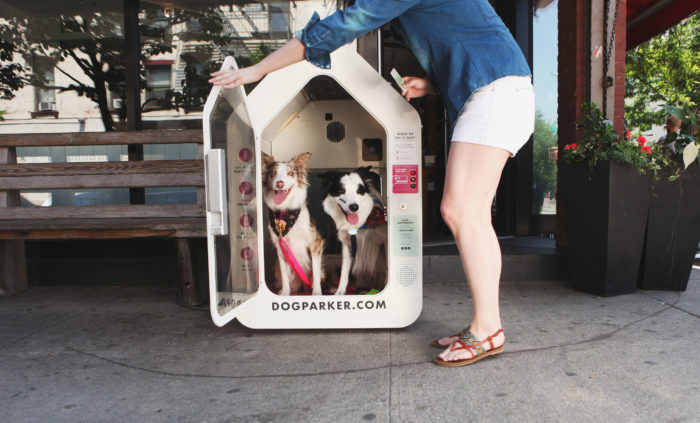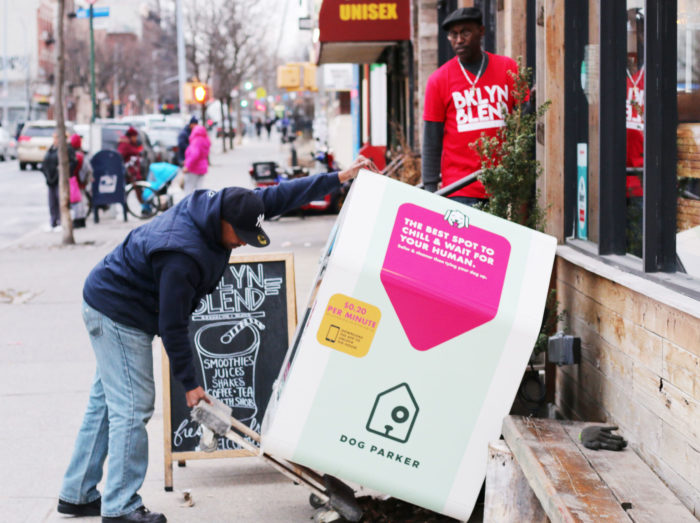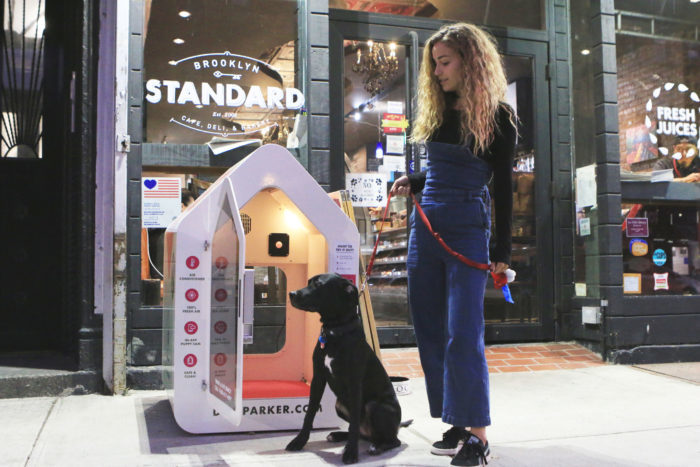Dog Gone! Why Did the City Kick out the Digital Dog Houses?
Dog Parker, a Brooklyn startup, removes its pet-sitting devices after a showdown with New York City regulators
A Dog Parker with double occupancy outside a Williamsburg cafe (Photos courtesy of Dog Parker)
It’s a winter morning and you and your furry friend are en route to grab a cup of coffee. The issue at hand: when it’s time for you to run inside to order your Americano–there’s also a long line–your dog is stuck outside waiting for you in 25-degree weather. And if it were summer? Your dog might be waiting in 85-degree heat.
This is where Dog Parker comes in. A Brooklyn tech startup of a different breed, the company has created smart dog houses that provide pets with climate-controlled comfort, set up outside shops, notably food stores where dogs aren’t allowed inside. The digital doghouses come equipped with all sorts of features to give pet owners peace of mind, including a camera that can be viewed via a smartphone app and an ultraviolet light to kill germs.
Co-founded by Chelsea Brownridge, her husband Todd Schecter and a friend, Dog Parker launched in 2015, landed $1.1 million in seed-investor funding last year, and established a network of 40 dog houses around the city. Then suddenly last November, New York City’s Department of Transportation (DOT) sent Dog Parker a letter saying that the houses must go.

One of the devices gets hauled away last Friday, by order of the DOT
So last Friday, the company did just that, hauling away the houses and vowing to take its business to other, friendlier cities. The turn of events was met with indignation among elected officials. “We cannot simultaneously champion Brooklyn as a growing hub of innovation while we stifle our very own home-grown business,” said City Council Member Stephen Levin.
The showdown between Dog Parker and the DOT seems like something of a misunderstanding, possibly because the digital dog houses don’t really fit snugly into established regulatory categories. “In the first letter that we got, there was no citation of any kind of violation. They just told us that we had to go–that we were in the public right of way and had to go,” Brownridge told The Bridge. “And the reality is, there are lots of things that are completely legal in the public right of way, like news racks and bike racks. There’s a process for those things, so all along we had just been asking ‘Well, what could our process be?’”

Dog Parker co-founder Chelsea Brownridge
Brownridge feels that the DOT order came out of the blue. “As you can imagine, for a young company that had been operating for a couple of years with no problems, no complaints, no violations, it was a pretty shocking thing to hear,” she said. Brownridge claims the company’s appeals for meetings with the DOT went unanswered. “We just weren’t met with a lot of cooperation or answers all along.” The DOT claims otherwise in a statement issued last Friday: “The City had been in discussions with Dog Parker Inc. for more than a year about their structures that create obstructions on sidewalks that are clearly public property.”
Before the abrupt removal, Dog Parker had survived a bit of controversy and kept at work improving the product. One writer called the device a “dog prison,” but climbed inside and found it pleasant enough. Brownridge responded to the jail comparisons by explaining that dogs are “den animals” who feel comfortable in enclosed spaces. The locked door, which can be opened and closed with the customer’s membership card, is an important safety element, she said. Along the way, the company changed the shape of the original structure, which was box-shaped, giving the device a peaked roof to make it easier for people to see it as a dog house rather than a container.
The banishment of Dog Parker is a surprise twist in the company’s startup story, given that the city had supported the venture with financing from the NYC Economic Development Corp. and the company works out of the entrepreneurial hotspot New Lab at the city-owned Brooklyn Navy Yard. “Dog Parker was born and is flourishing right here in our neighborhood,” stated Council member Levin. It seems strange to offer that support and then stifle an endeavor with red tape.” Said Brownridge: “I think that this is a bigger question of how does the city learn and change their culture around welcoming innovation. How do we allow companies to test ideas here? Right now, it just seems so much easier everywhere else than New York.”

The devices tended to be parked outside places where dogs aren’t allowed inside, like restaurants and food stores
This is something that Brownridge has discovered firsthand, since she’s been traveling around the U.S., meeting with potential Dog Parker markets. “I’ve been on the road for the last couple of months. We’ve been lining up other cities that we’ll be announcing very soon. We’ve been really lucky to meet with dozens of mayors recently. It’s ironic for us to be New York City-based and recently kicked off the streets and then to be welcomed into so many other places.”
The Dog Parker teams hopes to come back to New York at some point. “New York City cares so much about bringing technology companies here, but agencies need to learn how to interact with startups and new ideas. Because ultimately, if it’s a genuinely new thing, it’s not going to fit the current regulatory environment necessarily,” said Brownridge. City Council Member Rafael Espinal of Brooklyn, chair of the Consumer Affairs Committee, said he aims to propose legislation that would allow Dog Parker to return. “We love New York,” said Brownridge. “We have a lot of other opportunities in other places but we want to stay headquartered in New York if we can find our way forward.”













